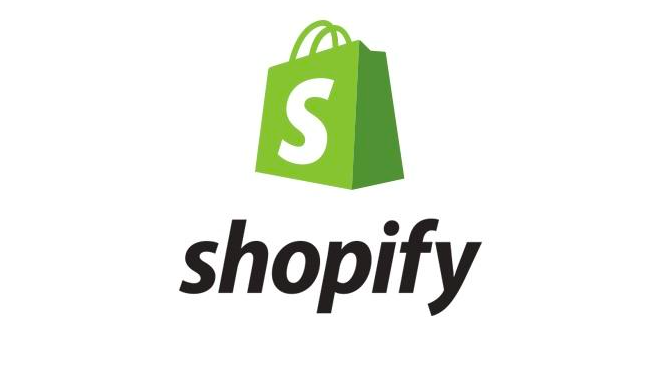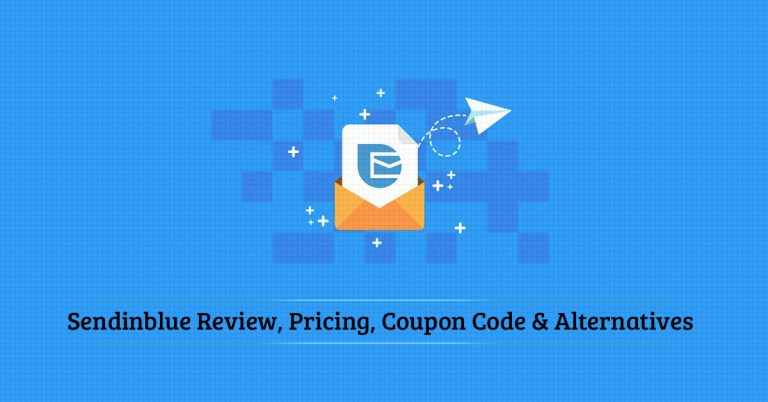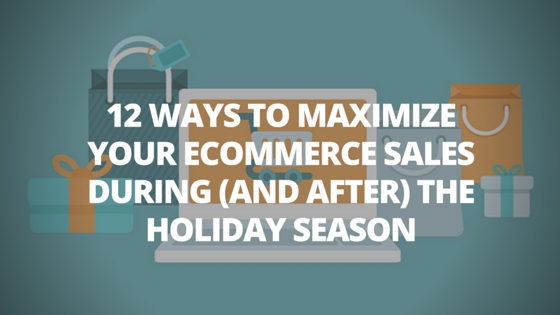
According to Statista, global retail eCommerce sales are at $4.1 trillion and will reach $4.9 trillion by 2021.
To dabble in this booming industry, you can use an eCommerce platform like Sellfy, to sell either physical or digital products online.
Unfortunately, multiple past Sellfy users recounted that it didn’t meet their interest. Not to mention, some users complained about its expensive pricing plans.
Hence, I will show you the best Sellfy alternatives.
Best Sellfy Alternatives
1. Shopify
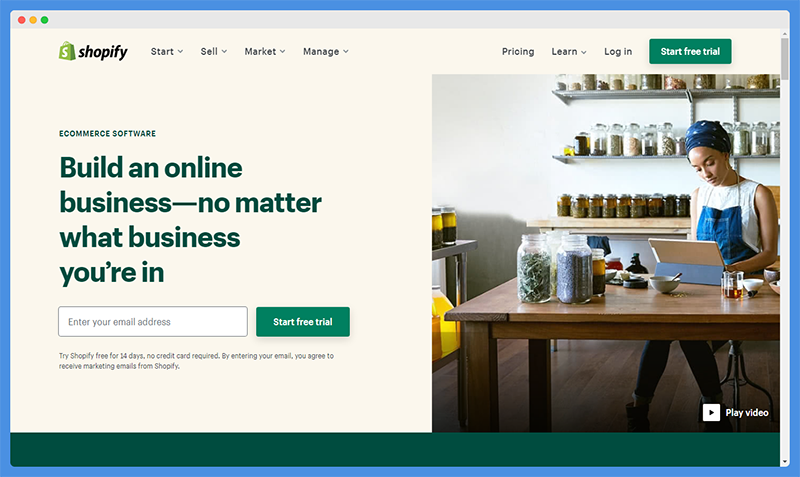
While Sellfy supports selling on online stores, websites/blogs, and YouTube,
Furthermore, you can use
With
However, Sellfy doesn’t compare to
Unlike Sellfy that supports only PayPal and Stripe,
You can secure your
Shopify Pricing
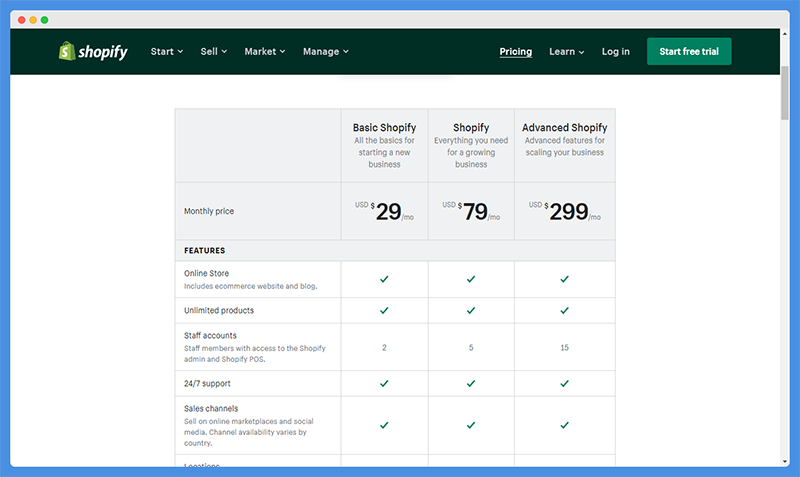
Here are
- Basic
Shopify Plan – $29 per month Shopify Plus – $2000 per month
Verdict: With
Set up your ecommerce store, pick a plan later. Check special pricing for Shopify =>
2. Shift4shop
Among our list of the best Sellfy alternatives, Shift4shop is a noteworthy choice to use for SEO purposes. Setting up an online store with Shift4shop is simple and you have about 50 free store themes to use.
Apart from being able to sell products on an online store, you can also sell on any website and social media platforms like Facebook. Plus, you can sell products on online marketplaces like eBay and Amazon. As a result, you have more selling options with Shift4shop than Sellfy.
Shift4shop also provides rich analytics and reports. You can view your store analytics and traffic statistics from product and category pages. From the Reports section, you can sort reports by business, customers, inventory, products, sales, etc.
Interestingly, Shift4shop features more third-party integrations than Sellfy. Aside from the social media and online marketplaces mentioned earlier, the platform also integrates with MailChimp, FedEx, AWeber, QuickBooks, UPS, Zapier, Avalara, Drip, and others.
For payments, Shift4shop supports PayPal and Stripe like Sellfy and extends to Visa, Square, Authorize.net, Elavon, etc. In total, Shift4shop supports over 100 payment gateways.
Nevertheless, Shift4shop incorporates anti-fraud tools to protect merchants and customers. It is PCI certified with 2FA and HTTPS support.
Shift4shop Pricing
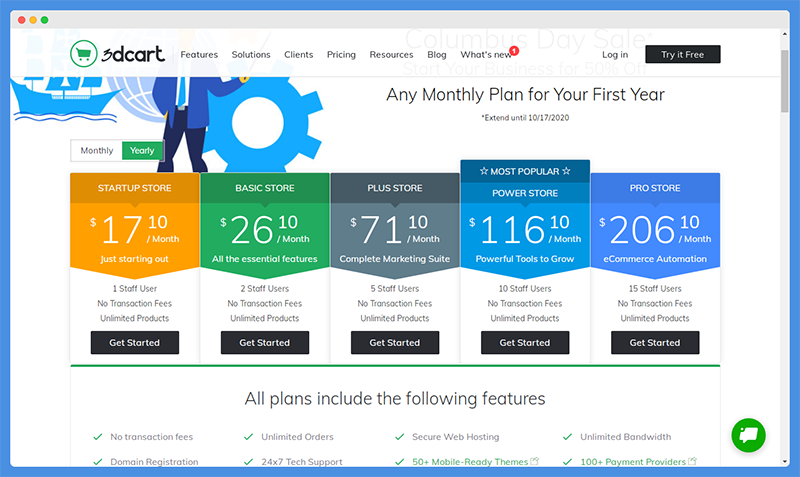
Shift4shop provides you with a variety of subscription plans, including:
- Startup Store – $19 per month billed every month, or $17.10 per month for annual payment
- Basic Store – $29 per month billed every month, or $26.10 per month for annual payment
- Plus Store – $79 per month billed every month, or $71.10 per month for annual payment
- Power Store – $129 per month billed every month, or $116.10 per month for annual payment
- Pro Store – $229 per month billed every month, or $206.20 per month for annual payment
Verdict: Shift4shop is an ideal Sellfy alternative if you’re considering cheaper pricing, more integrations, and more payment gateways. It even gives a tough fight to more popular platforms like Shopify and others.
3. Gumroad
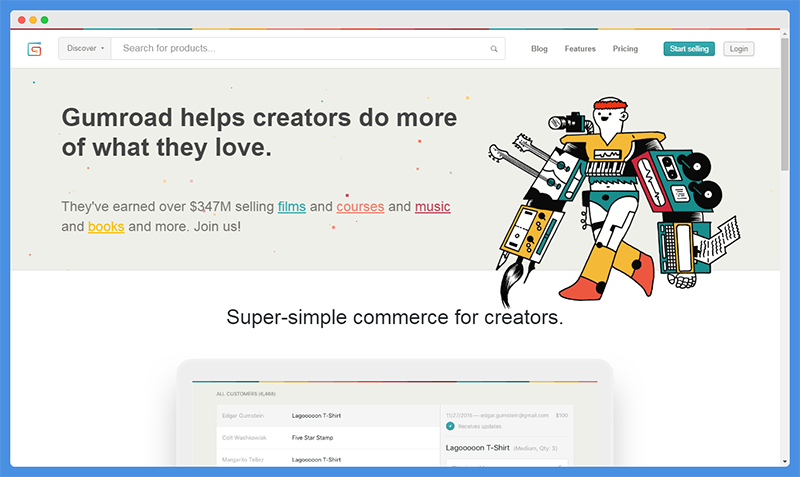
Gumroad and Sellfy are both eCommerce platforms but still different. You have more selling features on Sellfy than Gumroad as the platform is somewhat limited to content creators alone. Nevertheless, setting up and using Gumroad is much easier, unlike Sellfy.
With Gumroad, you can host your online store and get a free domain name. Unlike Sellfy, you can’t sell on social media platforms or other websites using Gumroad.
Gumroad delivers useful insights and statistics although it is not as in-depth and detailed as Sellfy. You can get these analytics directly from your Gumroad dashboard. For deeper insights regarding your Gumroad store, you can use Google Analytics.
Interestingly, Gumroad has more integrations than Sellfy. While Sellfy is limited to Messenger, Zapier, YouTube, Vimeo, and Soundcloud, Gumroad integrates with Zapier, ConvertKit, Booklaunch, WordPress, IFTTT, InfusionSoft, YouTube, Drip, Sketchfab, and more.
Payment on Gumroad is mainly via its native payment gateway. Likewise, merchants can withdraw their payments via PayPal, but customers cannot pay via PayPal.
Likewise, Gumroad secures online stores with SSL encryption and keeps merchant files secure with PDF stamping.
Gumroad Pricing
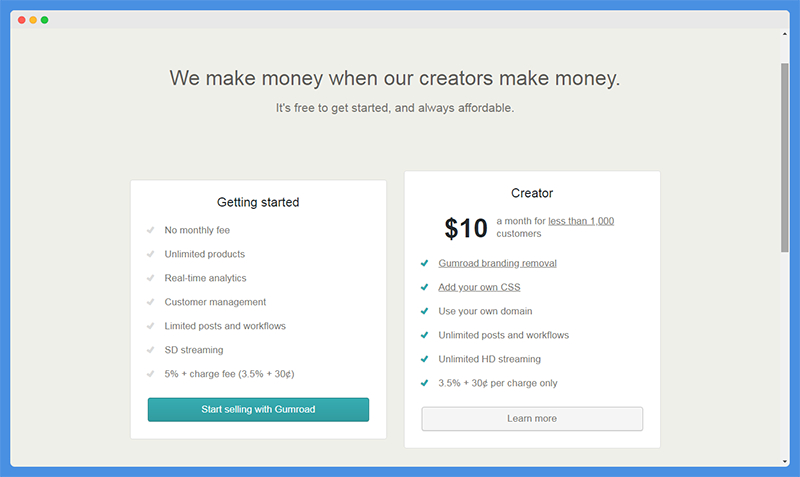
Gumroad has affordable pricing plans, which includes:
- Getting Started Plan – $0 per month
- Creator Plan – $10 per month for less than 1,000 customers
Verdict: Gumroad might not be much better than Sellfy, but it provides many benefits for content creators. Furthermore, the free plan is an ideal one for starters who want to save money and even the paid plan is affordable.
Also Read: Gumroad Vs Samcart
4. Etsy
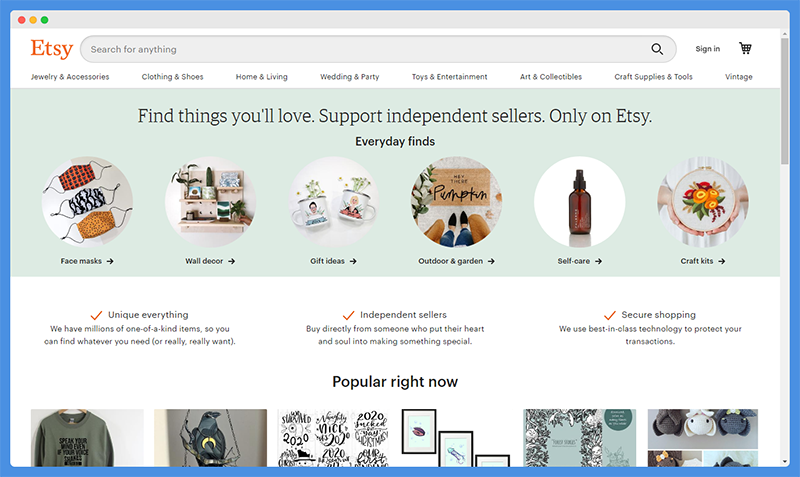
Etsy is another Sellfy alternative that you can consider. Unlike Shopify or other Sellfy alternatives, Etsy is an online marketplace that enables you to launch an online shop for selling products.
With Etsy, you can sell your products by listing them directly on the market without the need to design your online store. This is unlike Sellfy where you have to build and host your store.
However, this implies that you can’t sell your Etsy products using a custom domain name and hosting. Your products are only featured in their marketplace according to your predefined category.
Thankfully, Etsy provides detailed statistics and analytics so you can monitor your business, traffic sources, and performance trends. Plus, you can connect to Google Analytics for more insights.
Likewise, Etsy supports more third-party integrations than Sellfy. For instance, Etsy integrates with Salesforce, MailChimp, HubSpot, Zendesk, GetResponse, ActiveCampaign, etc. Also, it supports custom integrations via the Etsy API.
Etsy also supports more payment gateways including PayPal, Stripe, Apple Pay, Discover, Google Pay, and credit/debit cards.
Etsy Pricing
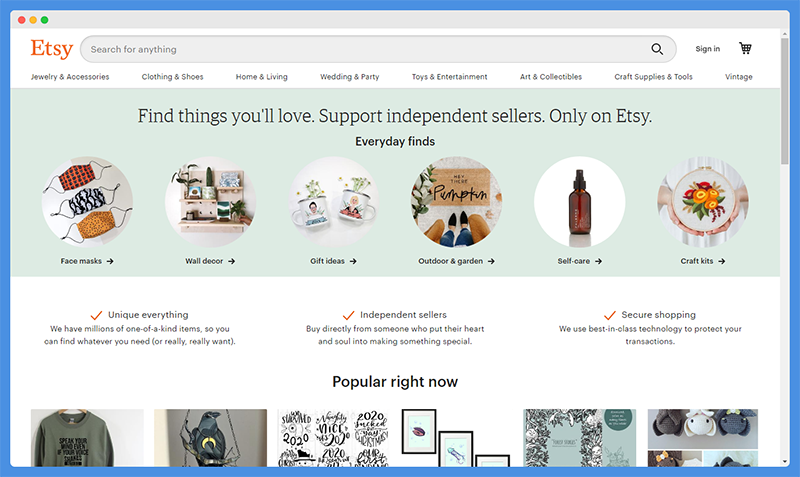
As an online marketplace, Etsy is priced differently from Sellfy. You don’t pay monthly subscriptions to use Etsy, listing fees are charged instead. To list a product on Etsy, a $0.20 is charged and it lasts for 4 months if the product is not sold.
Additionally, for every sale, a 5 percent transaction fee is charged. If you want to include your products on Etsy adverts on other sites, a 15 percent transaction fee is charged instead when the product gets sold.
Verdict: Etsy is an online marketplace while Sellfy is an eCommerce platform, so both platforms are relatively different. Nevertheless, you should opt for Etsy if you need a platform for quicker management.
5. BigCommerce

BigCommerce is a popular Sellfy alternative that has been around since 2003.
It features an intuitive page builder, so you can quickly build your dream store on BigCommerce than on Sellfy.
While Sellfy is limited to the store, websites, and YouTube, BigCommerce enables you to sell on an online store, Facebook, Instagram, Google Shopping, Amazon, and eBay.
It also delivers reliable analytics and integrates with multiple third-party platforms. In fact, BigCommerce has over 500 apps in its apps marketplace.
There are more mediums for receiving payments on BigCommerce than Sellfy. You can use PayPal or recurring billing subscription apps like PayWhirl, Subscrimia, MiniBC, Ordergroove, etc.
When you host your online store on BigCommerce, you are guaranteed premium SSL, 99.9 percent uptime, and a dynamic site seal. Plus, you can utilize Google Cloud storage and utilize Google AMP for faster loading on mobile.
A unique feature for BigCommerce is its mobile application which is absent on Sellfy. You can download the BigCommerce mobile app on your Android and iOS devices.
BigCommerce Pricing
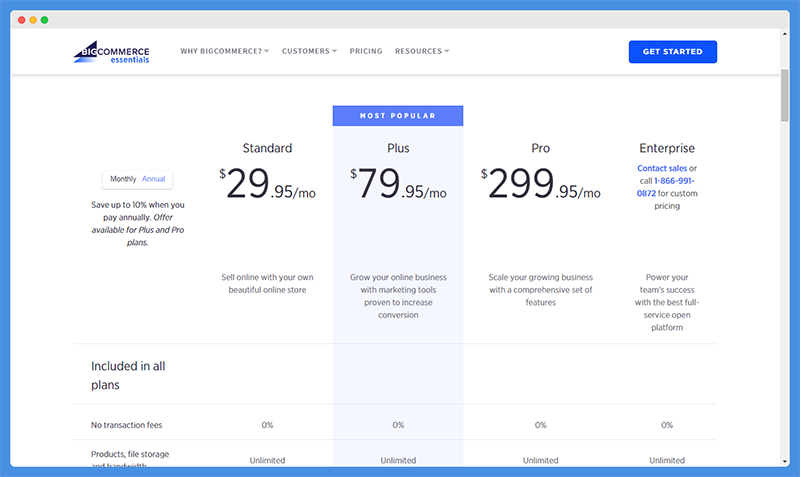
Here are the BigCommerce pricing plans:
- Standard Plan – $29.95 per month
- Plus Plan – $79.95 per month for monthly payment, or $71.95 per month for annual payment
- Pro Plan – $299.95 per month when billed every month, or $269.96 per month when billed annually
- Enterprise Plan – Custom pricing
Verdict: BigCommerce is a better eCommerce platform than Sellfy in almost every area including supported selling places, integrations, payment gateways, and SEO. Notably, you can manage your store on the go using its mobile app.
6. SendOwl
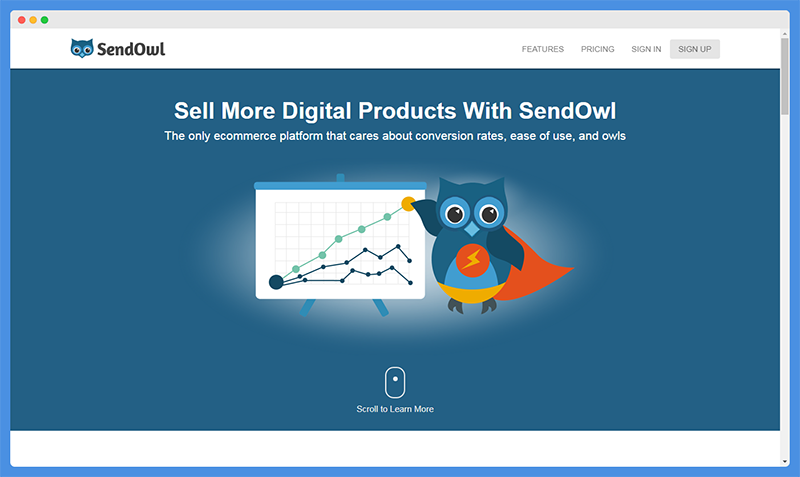
Another ideal Sellfy alternative on our list is SendOwl, an eCommerce platform for selling digital products. It has generated over $1.3 billion in sales since its launch.
An advantage of SendOwl over Sellfy is its simplicity. You can create products to sell in as little as 20 seconds. You don’t have to worry about how the products will be delivered, the payment gateway or your checkout as SendOwl automates the entire process.
Just like Sellfy, SendOwl lets you sell products on the site, or via any other website/blog, social media, and also via email. To help improve conversion, checkout pages are automatically converted to customers’ native languages.
You can use SendOwl to facilitate upsells, discounts, affiliates, gifting, and more. As a platform for digital products, it has drip functionality for releasing products in sets for subscribers and one-off payers.
With SendOwl analytics, you can keep an eye on your sales. It delivers insights into your products, income, discounts, orders, audience geography, etc. However, the analytics provided on Sellfy is deeper.
Also, SendOwl integrates with WordPress, ConvertKit, AWeber, Zapier, Campaign Monitor,
Furthermore, SendOwl supports more payment gateways including PayPal, Stripe, Apple Pay, AliPay, and BitPay (Bitcoin). The platform is a secure one with PDF stamping to prevent illegal product sharing.
SendOwl Pricing
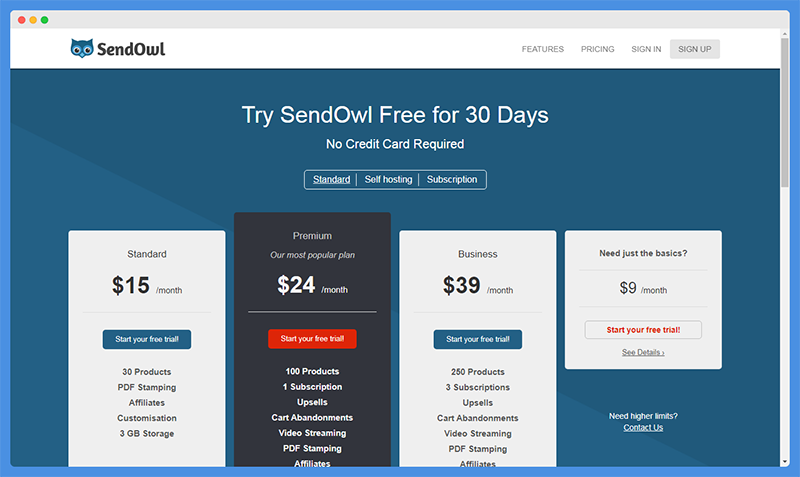
SendOwl features flexible pricing plans for its Standard package, which include:
- Basic Plan – $9 per month
- Standard Plan – $15 per month
- Premium Plan – $24 per month
- Business Plan – $39 per month
Verdict: If you sell digital products like videos, audios, eBooks, pictures, etc, SendOwl is a more specific eCommerce platform to use than Sellfy. Also, looking at its pricing plans, SendOwl is clearly more affordable than Sellfy.
Explore this interesting comparison of SendOwl with Thrivecart.
7. Payhip
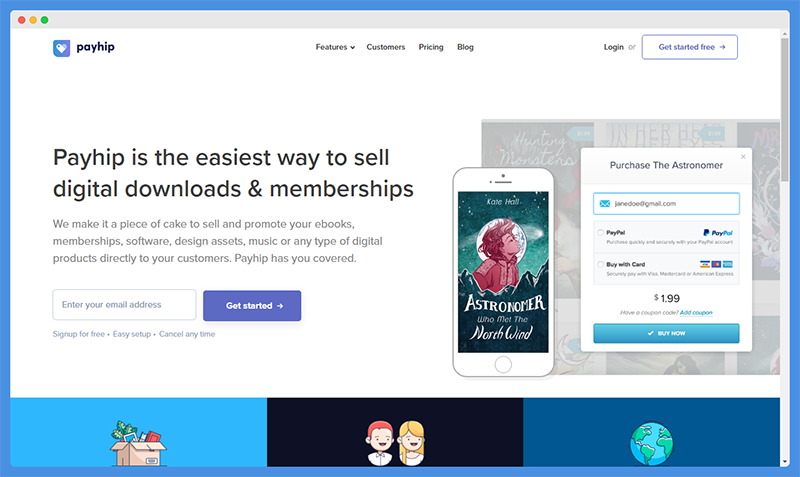
Payhip is another eCommerce platform specifically for those who sell digital products. Not to mention, it allows you to collect membership payments.
Notably, Payhip supports all digital file formats including texts, videos, and audios. Aside from selling on social media and your Payhip store, you can embed your product buttons on your website just like with Sellfy.
It provides you with comprehensive sales analytics that is displayed in graphs for total sales breakdown, daily views, and daily sales. Payhip doesn’t provide deep insights like Sellfy, but it is just enough to keep track of your activities.
Unlike Sellfy, Payhip integrates with Squarespace and WordPress. Nevertheless, you have more options for receiving payments with Payhip than Sellfy. Sellfy supports just Stripe and PayPal while Payhip supports PayPal, Stripe, and different credit cards including Visa, MasterCard, American Express, etc.
Furthermore, Payhip is a safe eCommerce platform. Digital files are protected with PDF stamping and software sellers can easily generate license keys for their products. Also, card and account payment details entered by customers are not stored.
Payhip Pricing
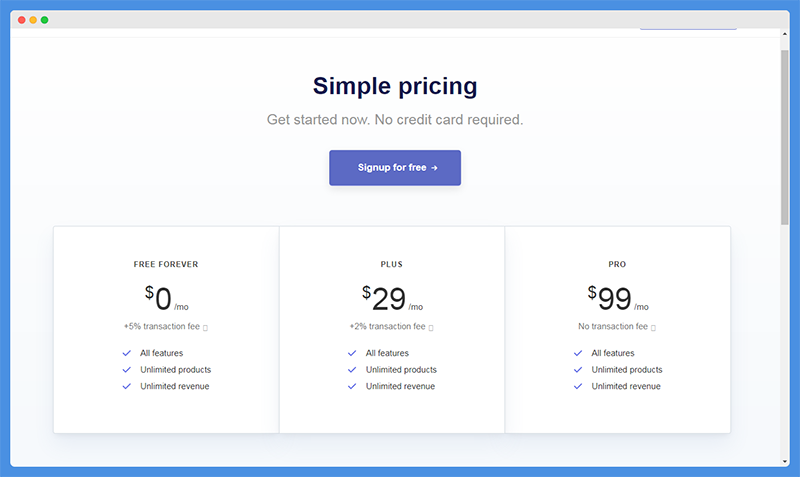
Payhip has three pricing plans, including:
- Free Plan – $0 per month
- Plus Plan – $29 per month
- Pro Plan – $99 per month
Verdict: Payhip is a more affordable eCommerce platform than Sellfy, it can even be used for free. Generally, Sellfy has more features but Payhip has ideal features for digital product sellers.
8. Jumpseller
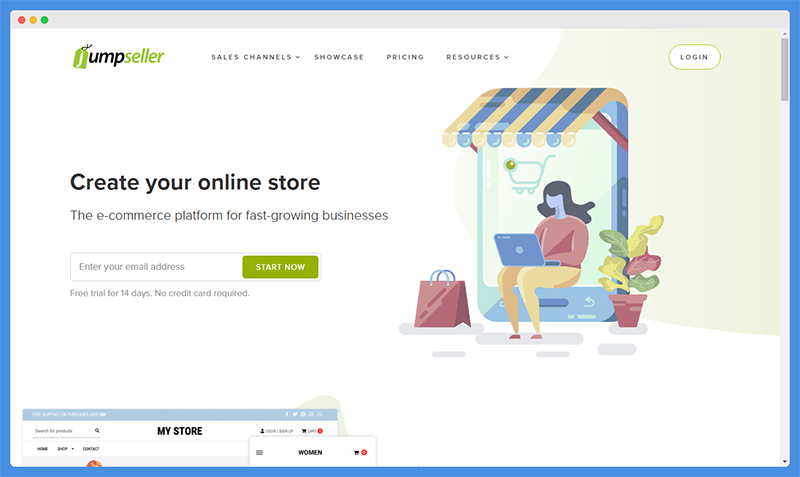
Unlike other best Sellfy alternatives mentioned earlier, Jumpseller enables you to sell physical and digital products on its platform.
While you can sell on an online store, websites/blogs, and YouTube with Sellfy, Jumpseller enables you to sell on Instagram, Twitter, Facebook, and Whatsapp.
You can build a more professional store with Jumpseller as you have professional responsive themes to install and customize. Furthermore, Jumpseller is a multilingual platform, so your customers can view your store in different languages.
Fulfilling your customer’s orders would be easier with Jumpseller than Sellfy as the platform partners with top shipping carriers. The result is cheaper shipping rates and faster shipping.
Concerning third-party integrations, Jumpseller is clearly ahead of Sellfy. Moreover, it integrates with Google Shopping, Analytics, Tag Manager, PayPal, Stripe, Skrill, HiPay, etc.
Furthermore, Jumpseller supports apps for even more integration. Some top apps in its app repository include Zapier, MailChimp, e-goi, Importify, Syncee, etc.
Jumpseller Pricing
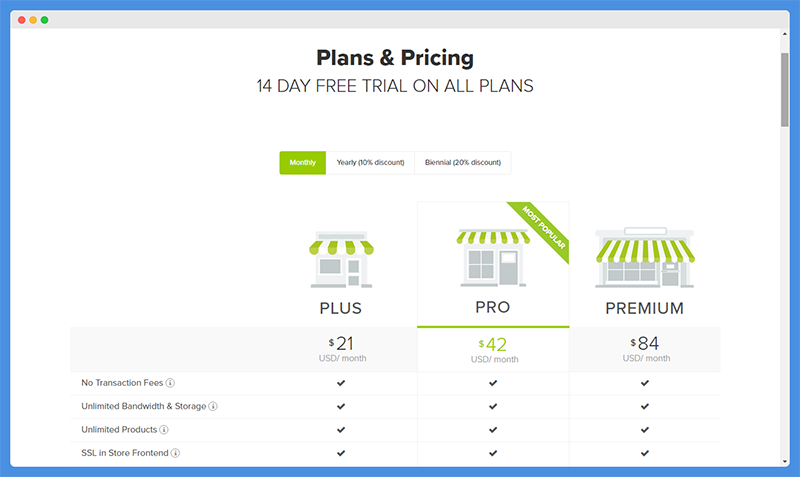
Jumpseller features three pricing plans:
- Plus Plan – $21 per month for monthly payment, $19 per month for annual payment, and $17 per month for biennial payment
- Pro Plan – $42 per month for monthly payment, $38 per month for annual payment, and $17 per month for biennial payment
- Premium Plan – $84 per month for monthly payment, $76 per month for annual payment, and $17 per month for biennial payment
Verdict: Jumpseller is richer in features than Sellfy with more integrations, payment gateways, store themes, and flexible pricing plans. It is an ideal Sellfy alternative to save money as its pricing plans are slightly lower.
9. Podia

The last Sellfy alternative on our list is Podia. It is an eCommerce platform for selling digital products and services such as online courses, downloads, webinars, memberships, etc.
With Podia, you can host as many digital products/services as you want. There are no upload, bandwidth, products, or customer limits.
If you have your store hosted somewhere already, you can move it to Podia free of charge. The platform supports 22 different currencies and 11 languages, so you can sell your products to customers in different parts of the world.
From the Podia dashboard, menus such as products, memberships, affiliates, customers, etc are separated for easier management. Podia doesn’t deliver rich analytics and insights like Sellfy, but you can get an overview of your sales stats.
The stats can be sorted by sales, products, online courses, membership plans, downloads, bundles, etc. These can be exported as CSV, while its integration with Google Analytics allows you to get richer analytics.
With Podia, you can drip content, pre-sell courses, set quizzes, run drip email campaigns, build sales funnels, send newsletters, etc. Sellfy does not have these features natively.
Furthermore, Podia integrates with Facebook Pixel, MailChimp, Google Analytics, Hotjar, Zapier, ThriveCart, and several other apps. It supports more third-party integrations than Sellfy. However, Podia only supports PayPal and Stripe for receiving payments, just like Sellfy.
Podia Pricing
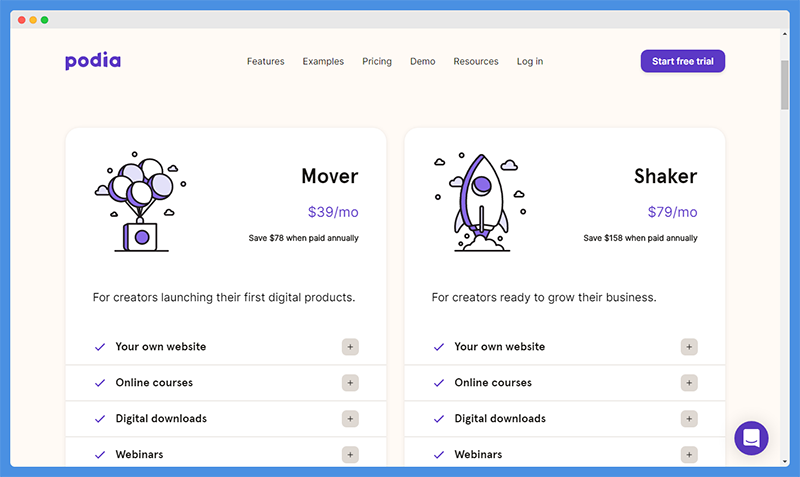
Podia features two simple pricing plans:
- Shaker Plan – $39 per month
- Mover Plan – $79 per month
Verdict: Podia incorporates features that are ideal for selling digital products, unlike Sellfy that focuses more on physical products. Hence, if you’re a digital seller, Podia is an ideal Sellfy alternative to use.
Wrap Up – What Is The Best Sellfy Alternative?
The best Sellfy alternative is
With

